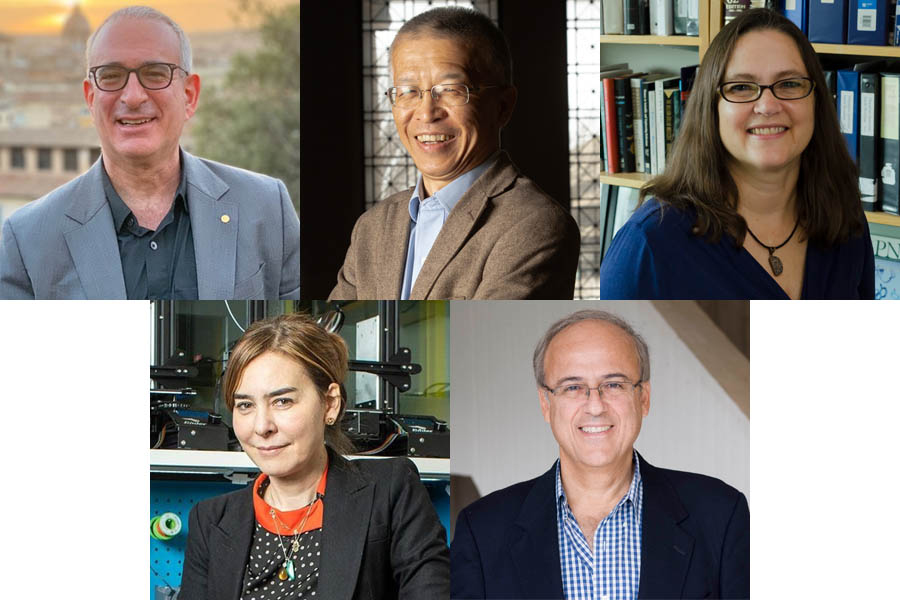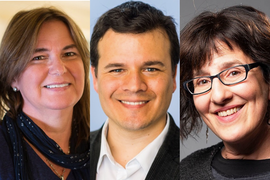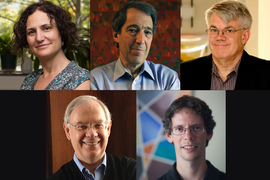The National Academy of Sciences has elected 120 members and 23 international members, including five faculty members from MIT. Joshua Angrist, Gang Chen, Catherine Drennan, Dina Katabi, and Gregory Stephanopoulos were elected in recognition of their “distinguished and continuing achievements in original research.” Membership to the National Academy of Sciences is one of the highest honors a scientist can receive in their career.
Established in 1863 by a Congressional charter that was signed by Abraham Lincoln, the National Academy of Sciences is a private, nonprofit society of distinguished scholars. Each year, new members are elected by their peers in recognition of their outstanding contributions to their field of research. Together with the National Academy of Engineering and National Academy of Medicine, the National Academy of Sciences aims to “encourage education and research, recognize outstanding contributions to knowledge, and increase public understanding in matters of science, engineering, and medicine.”
As of this year, the National Academy of Sciences has 2,565 active members and 526 international members. Among the new members added this year are eight MIT alumni, including Thomas Banks PhD ’73; Joan W. Bresnan PhD ’72; Jennifer Elisseeff PhD ’99; current faculty member Dina Katabi SM ’99, PhD ’03; Maria C. Lemos SM ’90, PhD ’95; William B. McKinnon ’76; Emmanuel Saez PhD ’99; and Gunther Uhlmann PhD ’76.
Joshua Angrist
Joshua Angrist is the Ford Professor of Economics at MIT, a co-founder and director of MIT's Blueprint Labs, and a research associate at the National Bureau of Economic Research. Angrist and his collaborators have pioneered the use of natural experiments to answer important economic questions and developed new econometric tools that help social scientists and policymakers discover the causal effects of individual choices and government policy changes. Angrist’s research explores the economics of education and school reform, the impact of social programs on the labor market, and the labor market effects of immigration, regulation, and economic institutions.
Angrist received his bachelor’s degree in economics from Oberlin College in 1982 and completed his PhD in economics at Princeton University in 1989. He taught at Harvard University and the Hebrew University of Jerusalem before coming to MIT in 1996.
Angrist received the Sveriges Riksbank Prize in Economic Sciences in Memory of Alfred Nobel in 2021 with co-laureates Guido Imbens of the Stanford Graduate School of Business and David Card of the University of California at Berkeley. Angrist is a fellow of the American Academy of Arts and Sciences and the Econometric Society, a Margaret MacVicar Faculty Fellow, and has served as co-editor of the Journal of Labor Economics.
Gang Chen
Gang Chen is the Carl Richard Soderberg Professor of Power Engineering in the Department of Mechanical Engineering. Chen is a pioneer in nanoscale heat transfer and energy conversion. He has significantly contributed to the understanding of heat transfer and energy conversion mechanisms; developed high-performance thermoelectric materials, superior semiconductors, highly heat-conductive polymers, and water desalination materials; and advanced solar-thermal and solar photovoltaic technologies. Physics World chose Chen's work on cubic boron arsenide being a superior semiconductor as a Top 10 Breakthrough in 2022. Scientific American highlighted his directional solvent extraction and thermally charged batteries technologies as one of its annual top 10 World Changing Ideas in 2012 and 2014. His work on high-performance thermoelectric materials won an R&D 100 award.
Chen earned both his bachelor's and master's degrees from Huazhong University of Science and Technology in China and his PhD from UC Berkeley. He worked at Duke University and UCLA before joining the MIT faculty in 2001. Chen served as department head of MIT’s Department of Mechanical Engineering from 2013 to 2018 and director of the Solid-State Solar-Thermal Energy Conversion Center for the U.S. Department of Energy EFRC from 2009 to 2018.
Chen is a dedicated mentor and advocate for diversity and inclusion in STEM fields. He has supervised 86 master's and PhD theses and 60 postdocs. Chen received an NSF Young Investigator Award, an ASME Heat Transfer Memorial Award, an ASME Frank Kreith Award in Energy, a Nukiyama Memorial Award from Japan Heat Transfer Society, a World Technology Network Award in Energy, an SES Eringen Medal, and the Capers and Marion McDonald Award for Excellence in Mentoring and Advising from MIT. He is an academician of Academy Sinica, a fellow of the American Academy of Arts and Sciences, and a National Academy of Engineering member.
Catherine Drennan
Catherine Drennan, professor of biology and chemistry, combines X-ray crystallography, cryo-electron microscopy and other biophysical methods, with the goal of “visualizing” molecular processes by obtaining snapshots of enzymes in action.
Drennan earned her bachelor’s degree from Vassar College, and her PhD from the University of Michigan. Following a postdoctoral fellowship at Caltech, she joined the MIT faculty in 1999, and was named a Howard Hughes Medical Institute Professor in recognition of her teaching in 2006 and a Howard Hughes Medical Institute Investigator in recognition of her research in 2008. Drennan has led by example, dedicating herself to both research and teaching. Her educational initiatives include creating free resources for educators that help students recognize the underlying chemical principles in biology and medicine, and training graduate student teaching assistants and mentors to be effective teacher–scholars.
Recently, the American Society for Biochemistry and Molecular Biology chose Drennan as the recipient of the 2023 William C. Rose Award for her outstanding contributions to biochemical research and commitment to training younger scientists. Among her additional honors are the Everett Moore Baker Memorial Award for Excellence in Undergraduate Teaching, the Harold E. Edgerton Faculty Achievement Award, the Dean’s Educational and Student Advising Award, a Committed to Caring Award, and a Presidential Early Career Award for Scientists and Engineers (PECASE). She has also been named an MIT MacVicar Fellow, a AAAS fellow, an ASBMB fellow, an Alfred P Sloan Fellow, and a Searle Scholar, and she is a member of the American Academy of Arts and Sciences.
Dina Katabi
Dina Katabi is the Thuan and Nicole Pham Professor of Electrical Engineering and Computer Science (EECS), director of the MIT Center for Wireless Networks and Mobile Computing, and a principal investigator at both the Computer Science and Artificial Intelligence Laboratory (CSAIL) and the Abdul Latif Jameel Clinic for Machine Learning in Health (Jameel Clinic), and a co-founder of Emerald Innovations. At CSAIL, she conducts mobile computing, machine learning, and computer vision research while leading the NETMIT group. Katabi is known for her contributions to wireless data transmission, developing wireless devices that assist with digital health using AI and radio signals. These works include an in-home wireless device that continuously monitors the gait speed of patients with Parkinson’s to better track the progression of the disease, an AI model that detects Parkinson’s from individuals’ breathing patterns, and BodyCompass, a radio-frequency-based wireless device that captures sleep data without using cameras or body sensors.
Katabi received a bachelor’s of science from the University of Damascus and continued her studies at MIT, where she earned a master’s of science and a PhD in computer science. She joined EECS faculty in 2003.
She is a member of the American Academy of Arts and Sciences, the National Academy of Engineering, and the National Academy of Sciences, having received the 2013 MacArthur “genius grant” Fellowship as well as the Association for Computing Machinery Prize in Computing in 2018. Additionally, Katabi has earned the ACM Grace Murray Hopper Award, two Test of Time Awards from the ACM’s Special Interest Group on Data Communications, and a Sloan Research Fellowship.
Gregory Stephanopoulos
Gregory Stephanopoulos is the W. H. Dow Professor of Chemical Engineering and Biotechnology. His work focuses on biotechnology, specifically metabolic and biochemical engineering. His research group conducts research on various projects aiming at the development of biological production routes to chemical products and biofuels. The group is also investigating cancer as metabolic disease. He is renowned for his work in reprogramming the gene transcription network of particular bacteria in order to improve their efficiency in converting renewable raw material into valuable chemical products.
Stephanopoulos graduated from the National Technical University of Athens in 1973 with the a bachelor’s degree in chemical engineering. In 1975, he obtained his master’s degree from the University of Florida and, three years later, his PhD from the University of Minnesota. His professional career started in 1978 as assistant professor at Caltech, where he was promoted in 1984 to the rank of associate professor with tenure. In 1985, Stephanopoulos moved to MIT as a professor of chemical engineering. He was Bayer Professor between 2000 and 2006, when he was appointed to the W. H. Dow Professorship of Chemical Engineering and Biotechnology. From 1990 to 1997 he served as associate director of the Biotechnology Process Engineering Center (BPEC) at MIT. In 2016, he served as president of the American Institute of Chemical Engineers (AIChE).
Stephanopoulos has received many honors, including the 2019 Gaden Award for Biotechnology and Bioengineering, the 2017 Novozymes Award for Excellence in Biochemical and Chemical Engineering, and the 2016 Eric and Sheila Samson Prime Minister’s Prize for Innovation in Alternative Fuels. In 2010, he received the George Washington Carver Award for Innovation in Industrial Biotechnology and the ACS E. V. Murphree Award. From AIChE, he has received the R.H. Wilhelm Award (2001), the Founders Award (2007) and the William Walker Award (2014). In 2011, he received the Eni Prize in Renewable and Non-Conventional Energy, and in 2013 the John Fritz Medal from the American Association of Engineering Societies. Stephanopoulos is a member of the National Academy of Engineering and a corresponding member of the Academy of Athens.








